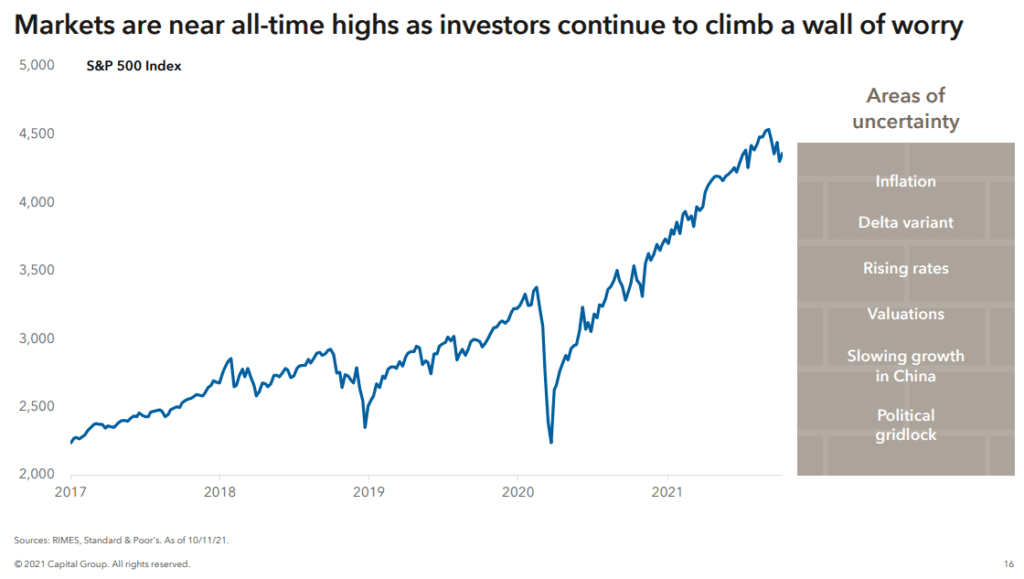Anxiety-inducing headlines, all-time stock market highs and an economy still recovering from a pandemic, have left many people hesitant to invest their cash savings.
None of us can make uncertainty disappear, but considering potential outcomes and evidence can make a huge difference in the returns you receive over your investing journey.
This week we are discussing strategies for how to fight the fear that comes when markets are near all-time highs.
Watching the news can be expensive
When reading and watching the news, it can be hard to remember that financial headlines are designed to pull at your insecurities.
Many of our everyday conversations now include inferences to supply chain issues, potential tax hikes, and inflation. The wall of worry can seem higher when crawling out of a pandemic shutdown and continues to impact investor’s confidence.
So naturally, record market highs have people wondering whether now is a good time to invest. The fear of an impending fall in the markets causes some to hold onto their cash instead of investing. Others don’t know what the right choice is for their money and are crippled by analysis paralysis.
By holding too much in cash, you’ll face the erosion of purchasing power over time due to inflation, but also experience the opportunity cost of stock market gains and the FOMO byproduct.

A financial planning process can help you make decisions
You don’t want to get stuck with analysis paralysis. A financial plan is key to understanding your investment strategy and helping you answer the question: should I invest my cash?
Walking through the financial planning process can help you create a disciplined and diversified strategy to provide added confidence in making your financial decisions.
By creating a financial plan, you can dial in your specific goals and time horizon. This helps you determine how much you’ll need in the short-run and how much you could afford to risk for the potential of higher expected returns in stock investments.
What if I invest it now and the bottom falls out?
The potential for an immediate drop after investing is always a risk investors wrestle with. And if investing in March 2000 or October 2007, you’d have to wait roughly 6 years each time to see a new all-time high.
Alternatively, there have been at least 10 record highs achieved each year over the past 9 years. So if you waited to invest during that time, because what goes up, must come down, you could still be waiting. Paralyzed by the fear of an impending drop.
One way to combat that fear is to analyze the numbers. Let’s look at historical data.
Of the people who invested at all-time highs since 1926, 81% were better off 1 year later and 77% were better off 5 years later. That still leaves a chance that you will lose money in the short-run, which is why it is important to have a safety net. And to this point, all market declines have been temporary.
Investing is like a roller coaster ride. The only time you could get hurt is if you get out of your seat.
 Investing pitfalls to watch out for
Investing pitfalls to watch out for
The average investor is susceptible to several common investing pitfalls.
One of these is recency bias. If a stock has performed well in the past then many assume that it will continue to do well. Rather than make this assumption you’ll need to study its performance over time.
Another pitfall is market timing. Many people get a feeling about the market and they try to time their entrance and exit, but history has shown that most people can not time the market accurately. Time in the markets is better than timing the markets.
Listen to this episode of Financial Symmetry to hear all of the perils that could arise by pressing play now.
Outline of This Episode
- [3:08] What is it about headlines that make people feel uncertain
- [5:51] A financial planning process can help you make decisions
- [8:14] What if I invest now and then the bottom falls out?
- [12:50] Pitfalls that average investors fall into
- [17:25] Today’s progress principle
Resources & Helpful Links
- Podcast: Investing for Inflation
- All time Highs for S&P 500 (Point 5 in article)
- Dimensional: All-Time High Anxiety
Connect With Chad and Grace
- https://www.financialsymmetry.com/podcast-archive/
- Connect on Twitter @csmithraleigh @TeamFSINC
- Follow Financial Symmetry on Facebook






